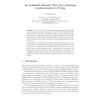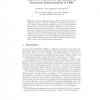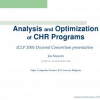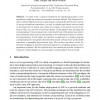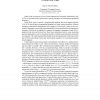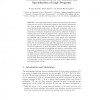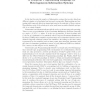113
click to vote
ICLP
2005
Springer
15 years 7 months ago
2005
Springer
The Semantic Web is a rapidly growing research area aiming at the exchange of semantic information over the World Wide Web. The Semantic Web is built on top of RDF, an XML-based ex...
102
click to vote
ICLP
2005
Springer
15 years 7 months ago
2005
Springer
Constraint Handling Rules (CHR) is a high-level rule-based language extension, commonly embedded in Prolog. We introduce a new occurrence representation of CHR programs, and a new ...
76
Voted
ICLP
2005
Springer
15 years 7 months ago
2005
Springer
115
click to vote
ICLP
2005
Springer
15 years 7 months ago
2005
Springer
Abstract. In recent work, a general framework for specifying program correspondences under the answer-set semantics has been defined. The framework allows to define different not...
136
click to vote
ICLP
2005
Springer
15 years 7 months ago
2005
Springer
Abstract. We instrument a higher-order logic programming search procedure to generate and check small proof witnesses for the Twelf system, an implementation of the logical framewo...
ICLP
2005
Springer
15 years 7 months ago
2005
Springer
113
click to vote
ICLP
2005
Springer
15 years 7 months ago
2005
Springer
The relationship between abstract interpretation and partial deduction has received considerable attention and (partial) integrations have been proposed starting from both the part...
153
click to vote
ICLP
2005
Springer
15 years 7 months ago
2005
Springer
1 In [20], a new Hybrid Probabilistic Logic Programs framework is proposed, and a new semantics is developed to enable encoding and reasoning about real-world applications. In this...
114
click to vote
ICLP
2005
Springer
15 years 7 months ago
2005
Springer
Abstract. Constraints and preferences are ubiquitous in real-life. Moreover, preferences can be of many kinds: qualitative, quantitative, conditional, positive or negative, to name...
ICLP
2005
Springer
15 years 7 months ago
2005
Springer
